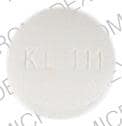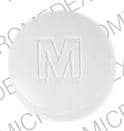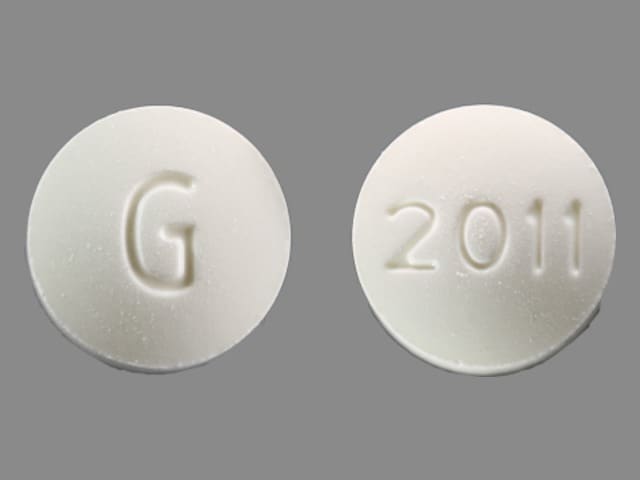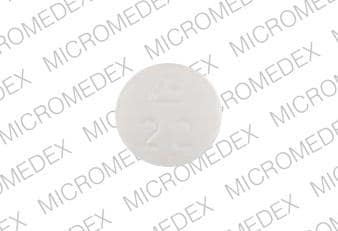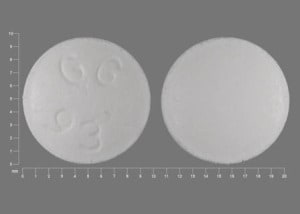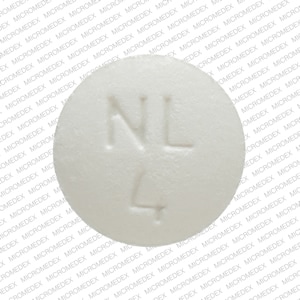Dosage Forms
Excipient information presented when available (limited, particularly for generics); consult specific product labeling. [DSC] = Discontinued product
Solution, Injection, as citrate:
Generic: 30 mg/mL (2 mL)
Solution, Injection, as citrate [preservative free]:
Generic: 30 mg/mL (2 mL [DSC])
Tablet Extended Release 12 Hour, Oral, as citrate:
Generic: 100 mg
Pharmacology
Mechanism of Action
Indirect skeletal muscle relaxant thought to work by central atropine-like effects; has some euphorigenic and analgesic properties
Pharmacokinetics/Pharmacodynamics
Metabolism
Extensively hepatic
Excretion
Primarily urine (8% as unchanged drug)
Onset of Action
Peak effect: Oral: Within 2 to 4 hours
Duration of Action
4 to 6 hours
Half-Life Elimination
14 to 16 hours
Protein Binding
20%
Use: Labeled Indications
Treatment of muscle spasm associated with acute painful musculoskeletal conditions
Contraindications
Hypersensitivity to orphenadrine or any component of the formulation; glaucoma; GI obstruction, stenosing peptic ulcer; prostatic hypertrophy, bladder neck obstruction; cardiospasm; myasthenia gravis
Dosage and Administration
Dosing: Adult
Muscle spasms:
Oral: 100 mg twice daily
IM, IV: 60 mg every 12 hours
Dosing: Geriatric
Avoid use (Beers Criteria [AGS 2019]).
Administration
Do not crush sustained release drug product.
Storage
Store at controlled room temperature. Protect injection solution from light.
Orphenadrine Images
Drug Interactions
Acetylcholinesterase Inhibitors: May diminish the therapeutic effect of Anticholinergic Agents. Anticholinergic Agents may diminish the therapeutic effect of Acetylcholinesterase Inhibitors. Monitor therapy
Aclidinium: May enhance the anticholinergic effect of Anticholinergic Agents. Avoid combination
Alcohol (Ethyl): May enhance the CNS depressant effect of Orphenadrine. Avoid combination
Alizapride: May enhance the CNS depressant effect of CNS Depressants. Monitor therapy
Amantadine: May enhance the anticholinergic effect of Anticholinergic Agents. Monitor therapy
Anticholinergic Agents: May enhance the adverse/toxic effect of other Anticholinergic Agents. Monitor therapy
Azelastine (Nasal): CNS Depressants may enhance the CNS depressant effect of Azelastine (Nasal). Avoid combination
Botulinum Toxin-Containing Products: May enhance the anticholinergic effect of Anticholinergic Agents. Monitor therapy
Botulinum Toxin-Containing Products: Muscle Relaxants (Centrally Acting) may enhance the adverse/toxic effect of Botulinum Toxin-Containing Products. Specifically, the risk for increased muscle weakness may be enhanced. Monitor therapy
Brimonidine (Topical): May enhance the CNS depressant effect of CNS Depressants. Monitor therapy
Bromopride: May enhance the CNS depressant effect of CNS Depressants. Monitor therapy
Bromperidol: May enhance the CNS depressant effect of CNS Depressants. Avoid combination
Cannabidiol: May enhance the CNS depressant effect of CNS Depressants. Monitor therapy
Cannabis: May enhance the CNS depressant effect of CNS Depressants. Monitor therapy
Chlorphenesin Carbamate: May enhance the adverse/toxic effect of CNS Depressants. Monitor therapy
Cimetropium: Anticholinergic Agents may enhance the anticholinergic effect of Cimetropium. Avoid combination
CNS Depressants: May enhance the CNS depressant effect of Orphenadrine. Avoid combination
Dimethindene (Topical): May enhance the CNS depressant effect of CNS Depressants. Monitor therapy
Dronabinol: May enhance the CNS depressant effect of CNS Depressants. Monitor therapy
Eluxadoline: Anticholinergic Agents may enhance the constipating effect of Eluxadoline. Avoid combination
Gastrointestinal Agents (Prokinetic): Anticholinergic Agents may diminish the therapeutic effect of Gastrointestinal Agents (Prokinetic). Monitor therapy
Glucagon: Anticholinergic Agents may enhance the adverse/toxic effect of Glucagon. Specifically, the risk of gastrointestinal adverse effects may be increased. Monitor therapy
Glycopyrrolate (Oral Inhalation): Anticholinergic Agents may enhance the anticholinergic effect of Glycopyrrolate (Oral Inhalation). Avoid combination
Glycopyrronium (Topical): May enhance the anticholinergic effect of Anticholinergic Agents. Avoid combination
Ipratropium (Oral Inhalation): May enhance the anticholinergic effect of Anticholinergic Agents. Avoid combination
Itopride: Anticholinergic Agents may diminish the therapeutic effect of Itopride. Monitor therapy
Kava Kava: May enhance the adverse/toxic effect of CNS Depressants. Monitor therapy
Levosulpiride: Anticholinergic Agents may diminish the therapeutic effect of Levosulpiride. Avoid combination
Lofexidine: May enhance the CNS depressant effect of CNS Depressants. Management: Drugs listed as exceptions to this monograph are discussed in further detail in separate drug interaction monographs. Monitor therapy
Magnesium Sulfate: May enhance the CNS depressant effect of CNS Depressants. Monitor therapy
MetyroSINE: CNS Depressants may enhance the sedative effect of MetyroSINE. Monitor therapy
Minocycline (Systemic): May enhance the CNS depressant effect of CNS Depressants. Monitor therapy
Mirabegron: Anticholinergic Agents may enhance the adverse/toxic effect of Mirabegron. Monitor therapy
Nabilone: May enhance the CNS depressant effect of CNS Depressants. Monitor therapy
Nitroglycerin: Anticholinergic Agents may decrease the absorption of Nitroglycerin. Specifically, anticholinergic agents may decrease the dissolution of sublingual nitroglycerin tablets, possibly impairing or slowing nitroglycerin absorption. Monitor therapy
Oxatomide: May enhance the anticholinergic effect of Anticholinergic Agents. Avoid combination
Oxomemazine: May enhance the CNS depressant effect of CNS Depressants. Avoid combination
Paraldehyde: CNS Depressants may enhance the CNS depressant effect of Paraldehyde. Avoid combination
Piribedil: CNS Depressants may enhance the CNS depressant effect of Piribedil. Monitor therapy
Potassium Chloride: Anticholinergic Agents may enhance the ulcerogenic effect of Potassium Chloride. Management: Patients on drugs with substantial anticholinergic effects should avoid using any solid oral dosage form of potassium chloride. Avoid combination
Potassium Citrate: Anticholinergic Agents may enhance the ulcerogenic effect of Potassium Citrate. Avoid combination
Pramipexole: CNS Depressants may enhance the sedative effect of Pramipexole. Monitor therapy
Pramlintide: May enhance the anticholinergic effect of Anticholinergic Agents. These effects are specific to the GI tract. Consider therapy modification
Ramosetron: Anticholinergic Agents may enhance the constipating effect of Ramosetron. Monitor therapy
Revefenacin: Anticholinergic Agents may enhance the anticholinergic effect of Revefenacin. Avoid combination
ROPINIRole: CNS Depressants may enhance the sedative effect of ROPINIRole. Monitor therapy
Rotigotine: CNS Depressants may enhance the sedative effect of Rotigotine. Monitor therapy
Rufinamide: May enhance the adverse/toxic effect of CNS Depressants. Specifically, sleepiness and dizziness may be enhanced. Monitor therapy
Secretin: Anticholinergic Agents may diminish the therapeutic effect of Secretin. Management: Avoid concomitant use of anticholinergic agents and secretin. Discontinue anticholinergic agents at least 5 half-lives prior to administration of secretin. Consider therapy modification
Selective Serotonin Reuptake Inhibitors: CNS Depressants may enhance the adverse/toxic effect of Selective Serotonin Reuptake Inhibitors. Specifically, the risk of psychomotor impairment may be enhanced. Monitor therapy
Tetrahydrocannabinol: May enhance the CNS depressant effect of CNS Depressants. Monitor therapy
Tetrahydrocannabinol and Cannabidiol: May enhance the CNS depressant effect of CNS Depressants. Monitor therapy
Thalidomide: CNS Depressants may enhance the CNS depressant effect of Thalidomide. Avoid combination
Thiazide and Thiazide-Like Diuretics: Anticholinergic Agents may increase the serum concentration of Thiazide and Thiazide-Like Diuretics. Monitor therapy
Tiotropium: Anticholinergic Agents may enhance the anticholinergic effect of Tiotropium. Avoid combination
Tolperisone: May enhance the adverse/toxic effect of Muscle Relaxants (Centrally Acting). Management: Monitor for increased sedation or CNS effects if tolperisone is combined with other centrally acting muscle relaxants. Consider decreasing the tolperisone dose if these agents are combined. Consider therapy modification
Umeclidinium: May enhance the anticholinergic effect of Anticholinergic Agents. Avoid combination
Adverse Reactions
Frequency not defined.
Cardiovascular: Palpitations, tachycardia
Central nervous system: Agitation, confusion, dizziness, drowsiness, euphoria, hallucination, headache
Dermatologic: Pruritus, urticaria
Gastrointestinal: Constipation, gastric irritation, nausea, vomiting, xerostomia
Genitourinary: Urinary retention, urination hesitancy
Hypersensitivity: Hypersensitivity reaction
Neuromuscular & skeletal: Tremor, weakness
Ophthalmic: Blurred vision, increased intraocular pressure, mydriasis, nystagmus
Respiratory: Nasal congestion
<1%, postmarketing, and/or case reports: Anaphylaxis (injection), aplastic anemia
Warnings/Precautions
Concerns related to adverse effects:
- CNS depression: May cause CNS depression, which may impair physical or mental abilities; patients must be cautioned about performing tasks which require mental alertness (eg, operating machinery or driving).
Disease-related concerns:
- Cardiovascular disease: Use with caution in patients with heart failure, cardiac decompensation, coronary insufficiency, tachycardia, or cardiac arrhythmias.
- Drug abuse: Use with caution in patients with a history of drug abuse or acute alcoholism; euphoria may occur at therapeutic doses and the potential for abuse exists.
Concurrent drug therapy issues:
- Sedatives: Effects may be potentiated when used with other sedative drugs or ethanol.
Dosage form specific issues:
- Sulfites: Injection contains sodium bisulfite which may cause allergic reaction in some individuals.
Other warnings/precautions:
- Long-term use: Has not been evaluated for continuous long-term use; monitor closely.
Pregnancy
Pregnancy Risk Factor
C
Pregnancy Considerations
Animal reproduction studies have not been conducted.
Patient Education
What is this drug used for?
- It is used to relax muscles.
Frequently reported side effects of this drug
- Nausea
- Vomiting
- Dry mouth
- Headache
- Constipation
- Fatigue
Other side effects of this drug: Talk with your doctor right away if you have any of these signs of:
- Severe loss of strength and energy
- Severe dizziness
- Passing out
- Confusion
- Anxiety
- Fast heartbeat
- Abnormal heartbeat
- Agitation
- Vision changes
- Unable to pass urine
- Sensing things that seem real but are not
- Tremors
- Signs of a significant reaction like wheezing; chest tightness; fever; itching; bad cough; blue skin color; seizures; or swelling of face, lips, tongue, or throat.
Note: This is not a comprehensive list of all side effects. Talk to your doctor if you have questions.
Consumer Information Use and Disclaimer: This information should not be used to decide whether or not to take this medicine or any other medicine. Only the healthcare provider has the knowledge and training to decide which medicines are right for a specific patient. This information does not endorse any medicine as safe, effective, or approved for treating any patient or health condition. This is only a brief summary of general information about this medicine. It does NOT include all information about the possible uses, directions, warnings, precautions, interactions, adverse effects, or risks that may apply to this medicine. This information is not specific medical advice and does not replace information you receive from the healthcare provider. You must talk with the healthcare provider for complete information about the risks and benefits of using this medicine.
